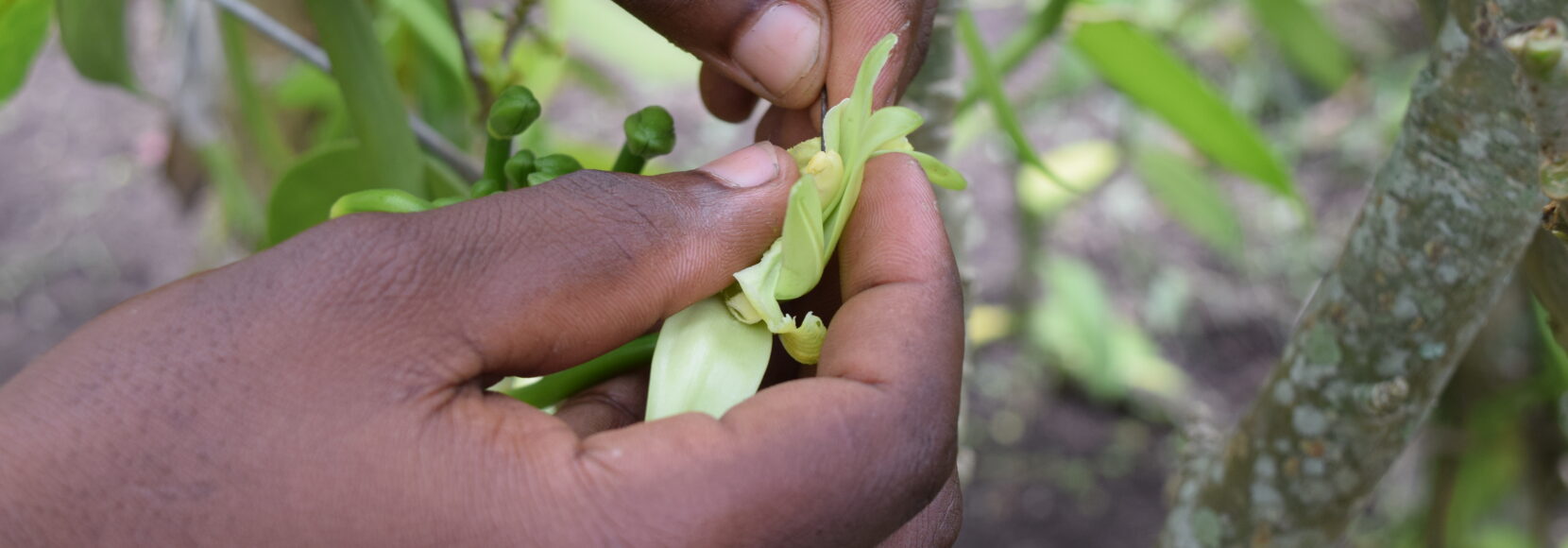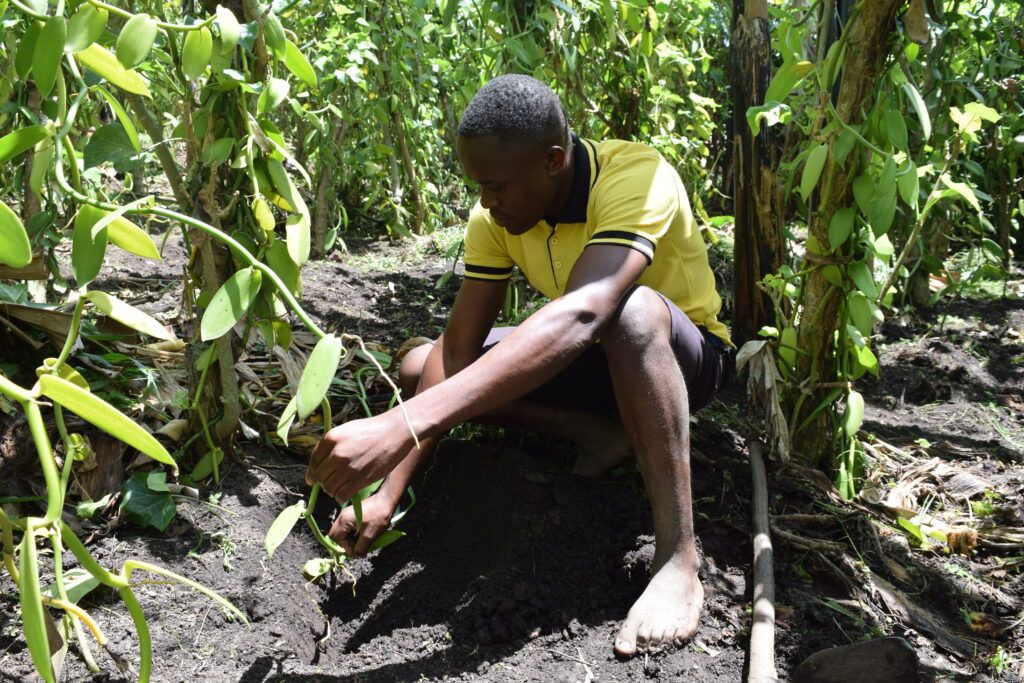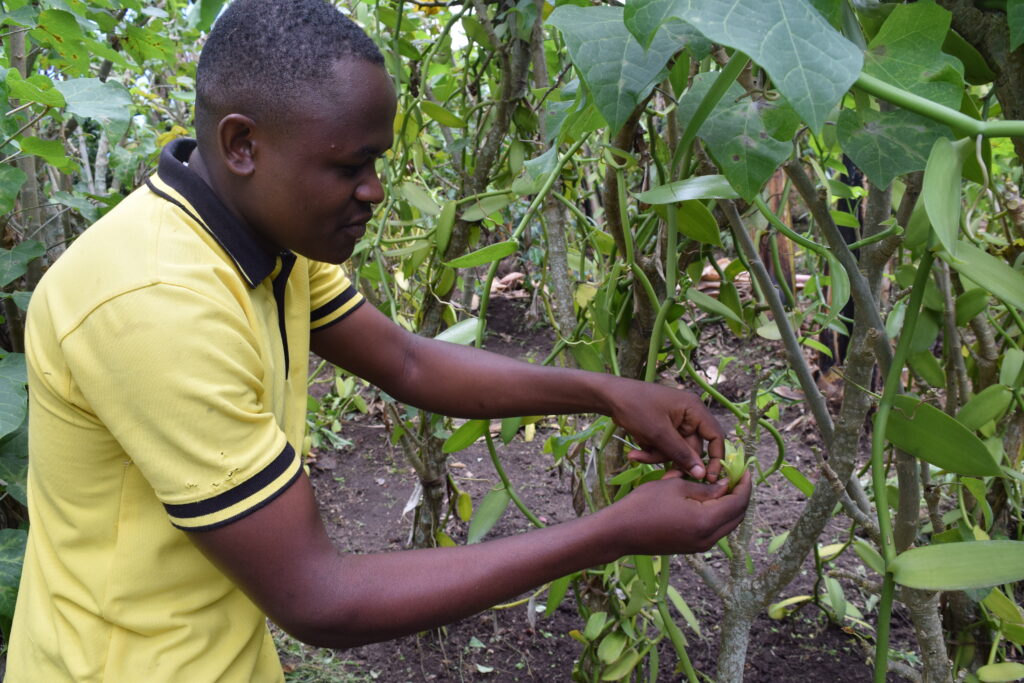
Young Vanilla Farmers Are Building Business Opportunities in Uganda
In Uganda, young people like Akankwasa Ismas are gaining new business skills to help them thrive as vanilla farmers.
In less than two years, Akankwasa Ismas, a 25-year-old from Rubirizi District in western Uganda, has seen his income increase nearly thirteenfold. The secret? Business training.
Uganda has one of the youngest populations in the world, and around 700,000 young people reach working age every year. However, there are not enough high-quality jobs to meet the demand. As a result, many young people work in the informal sector and struggle to earn a reliable living. Prioritizing youth empowerment and helping young people access the knowledge and skills they need to build their own successful enterprises is one way to address this challenge.
New Opportunities Through Vanilla Cultivation
Access to business training has been life-changing for Akankwasa. Just a few years ago, he struggled to identify job opportunities in his rural community. His father was a vanilla farmer, but Akankwasa did not picture that life for himself, particularly because vanilla production was not very lucrative at the time.
“My father initially planted vanilla when many [farmers] were abandoning their crops,” he shared. “A kilogram of vanilla fetched only 1,500 UGX ($0.39).” It wasn’t until Akankwasa joined a training being offered in his community that he made the leap into vanilla cultivation.
In 2022, Akankwasa participated in the Strengthening Rural Youth Development Through Enterprise (STRYDE) training as part of the VINES project. VINES is a United States Department of Agriculture-funded Food for Progress project working to transform the vanilla sector in Uganda. It is led by Catholic Relief Services and implemented by a consortium of partners, including TechnoServe.

Helping Youth Build Skills for the Future
Through the program, TechnoServe offers young people like Akankwasa comprehensive training in the STRYDE curriculum, focusing on both thematic and practical skills. The objective of the curriculum is to empower youth to develop new and improve existing small-scale businesses within their communities, fostering youth entrepreneurship and facilitating sustainable income generation through diversification.
“The curriculum comprises four modules: personal effectiveness, entrepreneurship, agribusiness, and personal finance,” explained Yonamu Mutabarura, a TechnoServe micro-enterprise counselor. “Our objective through these modules is to enlighten the youth about opportunities within their communities and empower them to create successful businesses that contribute to the development of their community.”
Akankwasa was selected to participate in the three-month curriculum. At the time, looked after his father’s vanilla garden but had no ambition of entering the vanilla business himself.
“After the training, I realized that I could make vanilla my business. My father gave me half an acre with 30 vanilla plants for me to start with,” he revealed. Today, Akankwasa has grown the vanilla garden to 400 plants, and he harvests 35 kilograms of vanilla during the short season and 120 kilograms during the more extended season.

Youth Empowerment: Sharing Knowledge with Peers
Akankwasa has also leveraged his proficiency in vanilla agronomy to provide vanilla-related on-farm services to farmers in nearby communities.
“I provide pollination and looping services to farmers—skills I acquired from my father,” he explained. “I also sell vines and mother plants to fellow farmers.” Looping is a method to encourage vanilla vines to stay healthy and productive. Hanging vanilla vines reaching the ground are put back in the soil to continue growing and climbing the shade tree. If left unlooped, vines lay on the ground and are mostly unproductive.
Akankwasa wants to share his newfound knowledge with other young people in his community. Thus far, he has trained 25 youths to offer similar services. Together, under the name Katanda Vanilla STRYDE Pollinators, they have started a Facebook page to advertise their services.
“Through the training, we learned about how we could market our businesses,” he shared. “So, we started a page to demonstrate our services and have been able to get a client from as far as Luweero (260 miles away).”
Their Facebook page has been crucial in creating new business opportunities. Accessing new opportunities has been especially important recently as vanilla market prices have significantly decreased, threatening Akankwasa’s livelihood.
“With the drop in vanilla prices, I’m getting fewer requests for pollination and looping services in my area. My clients call me for advice but do not have money to spend on my on-farm services,” Akankwasa explained. “However, through the Facebook page, we’ve managed to establish connections with new vanilla growers in Kiryandongo (276 miles away). So, the page is assisting us in finding a market beyond our community.”
The vanilla growers in Kirayndongo will mark Akankwasa’s second client to come through the Facebook page since its opening in September 2022. Reflecting on his journey, Akankwasa acknowledges the transformative impact of the training, which encouraged him to view challenges as business opportunities.
His dedication to maintaining his small vanilla and banana garden, coupled with his efforts in scouting for flowers to pollinate during the season, has led to a nearly thirteenfold increase in his income over the past year. Looking ahead, Akankwasa intends to remain in the vanilla business despite price fluctuations.
“Because of this experience, I can never give up on my vanilla,” he said.
In addition to continuing with vanilla, he wants to diversify his income and is saving to buy a plot of land in Katerera town where he can set up a shop. Akankwasa aims to generate enough money to support his mother and four siblings, who are still in school. After the family’s primary breadwinner passed away, he took on much of the financial responsibility.
Through the VINES project, 388 youths have completed the STRYDE curriculum. More than 95% of these young people have established small to medium-scale businesses within the vanilla value chain, creating seasonal and permanent jobs for peers and inspiring them to pursue their entrepreneurial ventures.





